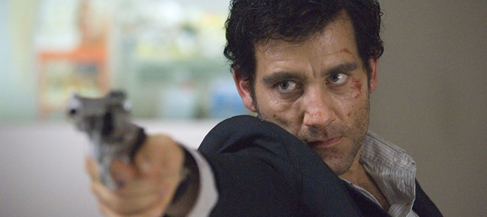Movie Review: The International
By Matthew Huntley
February 26, 2009
BoxOfficeProphets.com

Clive Owen stars as Interpol Agent Louis Salinger. At the beginning, he's in Berlin and watches from across the street as his colleague, Thomas Schumer (Ian Burfield), meets with an insider from the International Bank of Business and Credit (IBBC). The insider is looking to make a deal with Interpol and the Manhattan District Attorney's Office. He'll provide information he knows about the bank's connection to funding murder, wars and human trafficking. Salinger believes the bank is one of the world's epicenters for organized crime.
After the meeting, Schumer makes his way towards Salinger but falls to the ground and dies of cardiac arrest. Salinger suspects the cause of death wasn't natural and believes the IBBC is behind it (in hindsight, he remembers an unidentified man passing by Schumer after he met with their informant). He and Assistant DA Eleanor Whitman (Naomi Watts) continue their investigation to see just how far the criminal chain goes.
For Salinger, exposing the bank has become personal. He's been looking to bring its people to justice for the better part of his career. He has a history that suggests he's become obsessive and endangered, and with the amount of traveling he does - Berlin, France, Milan, New York, Istanbul - the guy could use a break. We come to sympathize with him.
Pieces start to come together after the bank allegedly arranges for the assassination of an Italian presidential nominee (Luca Barbareschi). Salinger and Whitman trace a footprint to the shooter (Bryan F. O'Byrne), whom they believe has made hits for the bank around the world. In an earlier scene, the presidential nominee explained the bank's business isn't about money, but about control - he who controls the world's debt controls the world.
I'm not entirely sure how plausible the plot of The International really is, but the writing, directing and acting made me believe such murder and conspiracies could really happen, and perhaps are happening right now. The director, Tom Tykwer, and his cast, led by the always solemn and powerful Owen, take the plot seriously, but not too seriously so that it becomes heavy handed. We care about it without feeling pandered to.
Outside of its routine thriller motions, what makes The International intriguing is its moral conflict. Salinger and Whitman are two people who perform their jobs because they want to see right done in the world, for no other reason than because it's right. Both of their bosses tell them it's not up to them to find justice. They represent the world's cynical attitude and laziness - the idea of leaving problems up to someone else and simply accepting crime as a vicious cycle. Even the bank's CEO (Ulrich Thomsen) tells Salinger that killing him won't do any good because there's another 100 ready to take his place. Salinger refuses to accept this and even gives the CEO's close adviser (Armin Mueller-Stahl) the chance to redeem himself by letting him help expose the bank. Otherwise, what would all of Salinger's work be for?
Questions like these make The International more complicated than we expect and give us something to discuss after the movie besides the action scenes. Speaking of action scenes, there is one really big one that takes place in the Guggenheim (you know if the filmmakers go to the trouble of bringing us to a set like the Guggenheim, which is most likely a replica, a grandiose shootout must take place within it). Luckily, this one pays off. There's also some striking cinematography by Frank Griebe, who composes some magnificent wide shots in each of the foreign cities. These assets, along with the thoughtful moral center and strong performances from Owen and Mueller-Stahl, allow The International to step slightly beyond the confines of its genre.